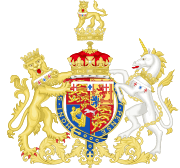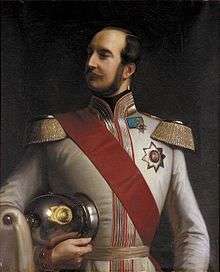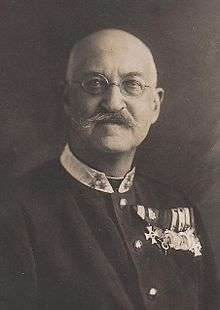Duke of Cumberland and Teviotdale
Duke of Cumberland and Teviotdale was a title in the Peerage of Great Britain that was held by junior members of the British Royal Family, named after the county of Cumberland, England and after Teviotdale, Scotland. Held by the Hanoverian royals, it was suspended under the Titles Deprivation Act 1917, which revoked titles belonging to enemies of the United Kingdom during the Great War.
| Dukedom of Cumberland and Teviotdale | |
|---|---|
 | |
| Creation date | 24 April 1799 |
| Creation | First |
| Monarch | King George III |
| Peerage | Peerage of Great Britain |
| First holder | Prince Ernest Augustus |
| Last holder | Prince Ernest Augustus |
| Remainder to | the 1st Duke's heirs male of the body lawfully begotten |
| Subsidiary titles | Earl of Armagh |
| Status | Suspended under the Titles Deprivation Act 1917 on 28 March 1919 |
History
The title Duke of Cumberland had been created three times in the Peerages of England and Great Britain.
In 1799 the double dukedom of Cumberland and Teviotdale, in the Peerage of Great Britain, was bestowed on Ernest Augustus (later King of Hanover), fifth son of King George III of the United Kingdom.[1] In 1837 Ernest became king of Hanover, and on his death in 1851 the title descended with the kingdom to his son King George V, and on George's death in 1878 to his grandson Prince Ernest Augustus, Crown Prince of Hanover. In 1866 Hanover was annexed by Prussia, but King George died without renouncing his rights. His son Ernest, while maintaining his claim to the kingdom of Hanover, was generally known by his title of Duke of Cumberland in Britain.[2]
The title was suspended for Ernest's pro-German activities during World War I under the Titles Deprivation Act 1917, as it was for his son. Under the Act the lineal male heirs of the 3rd Duke of Cumberland and Teviotdale have the right to petition the British Crown for the restoration of his peerages. To date, none has done so. The present heir is Prince Ernst August of Hanover (born 26 February 1954), great grandson of the 3rd Duke and current head of the House of Hanover. He is the senior male-line descendant of George III of the United Kingdom.
Dukes of Cumberland and Teviotdale
After the Union of Great Britain, the Hanoverian kings liked to grant double titles (one from one constituent country, one from another) to emphasise unity.
| Duke | Portrait | Birth | Marriages | Death |
|---|---|---|---|---|
| Prince Ernest Augustus House of Hanover 1799–1851 also: Earl of Armagh (1799) | 5 June 1771 Buckingham Palace son of King George III and Queen Charlotte | Duchess Frederica of Mecklenburg-Strelitz 1815 3 children | 18 November 1851 Hanover aged 80 | |
| Prince George House of Hanover 1851–1878 also: Earl of Armagh (1799) |  | 27 May 1819 Berlin son of Prince Ernest Augustus and Princess Frederica | Princess Marie of Saxe-Altenburg 1843 3 children | 12 June 1878 Paris aged 59 |
| Prince Ernest Augustus House of Hanover 1878–1919 also: Earl of Armagh (1799) |  | 21 September 1845 Hanover son of Prince George and Princess Marie | Princess Thyra of Denmark 1878 6 children | 14 November 1923 Gmunden aged 78 |
| The Titles Deprivation Act 1917 deprived the title on 28 March 1919. | ||||
See also
References
- "No. 15126". The London Gazette. 23 April 1799. p. 372.
-
